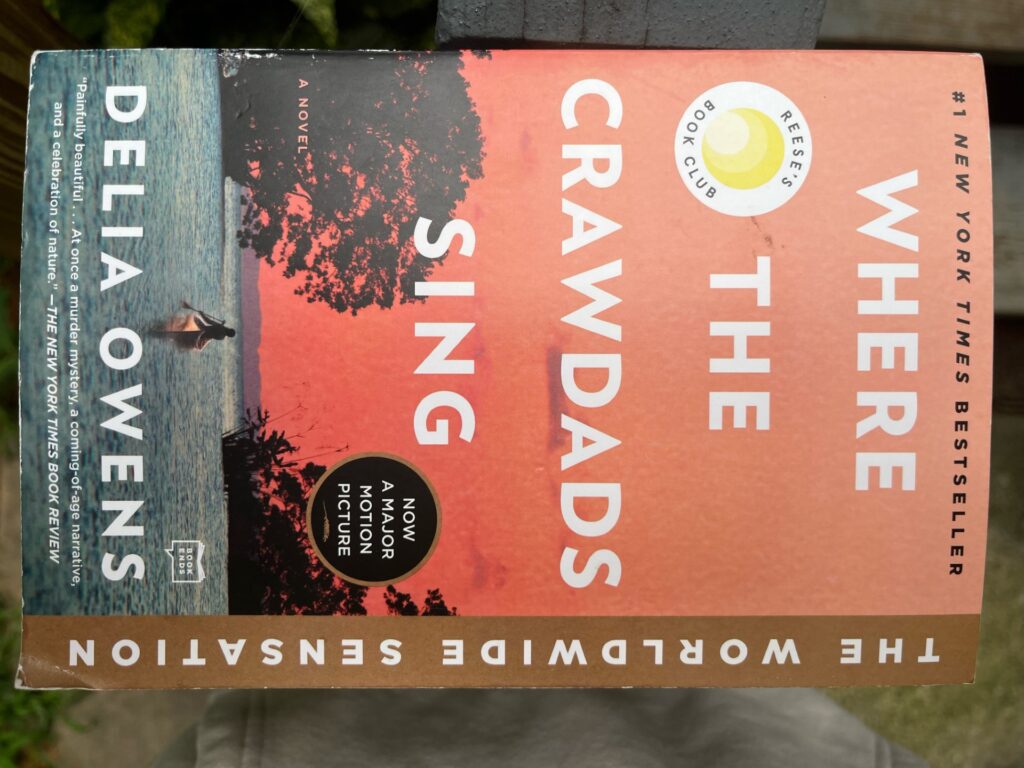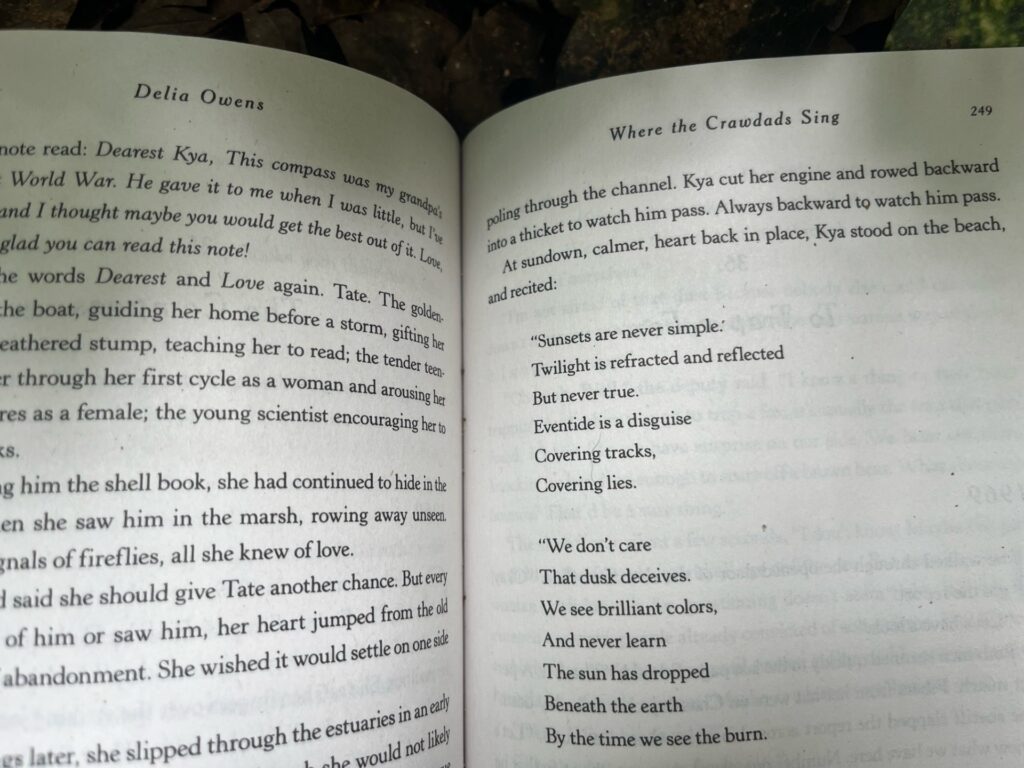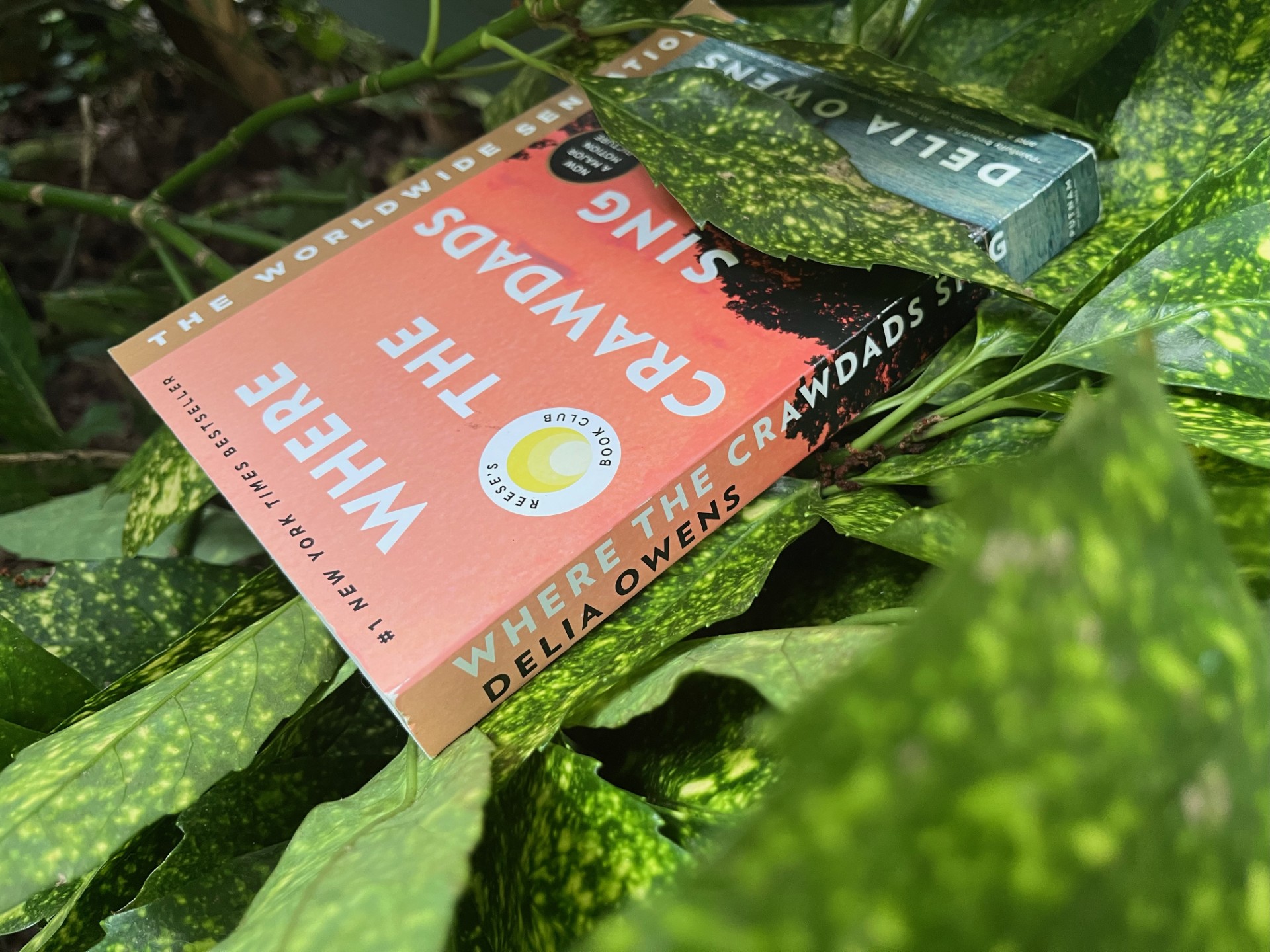My favorite segment of summer is the part the school system has decided to call “fall.” They may call it that all they want, but the 90 degrees I see on the thermostat makes me think a little differently. I love the warm August evenings. It feels like summer will last forever. You can go outside and feel the warmth without so much fear of getting sunburned. Late night bonfires and stargazing sessions are in order. Where the Crawdads Sing will always be my forever summer book. It reminded me of the wonder of nature and the freedom we once felt as children before we were regulated to intense schedules and long to-do lists. Written by Delia Owens, it is a bittersweet story that made a great impression on me.
Synopsis
Where the Crawdads Sing is the story of a girl named Kya who grew up in a rural, marshy part of North Carolina in the 50s and 60s. At a young age, her mother and four older siblings abandoned her at the rundown shack they lived in, broken because of the abuse of her father. She continued to live with her father, an alcoholic, learning how to take care of herself and keep herself hidden from prying truant officers. At the age of 10, her father disappeared completely, leaving her with not even the small allowance that she had been used to receiving occasionally.
She soon learned how to dig up mussels and fish for money to survive. Her father had left her a small boat and she was extremely familiar with the marsh. She found incredible delight in exploring the untouched world of the marsh and boated about it quite often. She was considered “white trash” and the townspeople nearby shunned her so she avoided others and primarily stayed in the wilderness she called home.

As a young teenager, she befriended a previous family friend named Tate, a boy a few years older than her. He taught her to read, gave her the resources to study independently, and shared a blooming love of science with her. Over time, their relationship developed into a romantic one: Kya’s first love. They were very closely bonded and it nearly destroys her when Tate leaves for college without saying goodbye. After being abandoned one by one by her family, she had finally allowed herself to trust in someone else, but they too had failed her.
A popular boy from the village named Chase soon becomes interested in her. His intentions are very different from Tate’s and Kya is aware of that. However, she allows herself to begin a romantic relationship with him merely due to her incredible loneliness and his lack of hostility towards her. After months of pursuit, he seems to truly be falling in love with her. He is constantly talking about marriage. He finally persuades her to become physically involved with him. She remains that way for several months before discovering that he is engaged to another woman in the town, after which she immediately cuts it off.
Tate slowly comes back into her life, back from college and studying wildlife on the very marsh that she lives for his job. He has always loved her and feels incredibly guilty about allowing his fear of her being incapable of living with him to cause him to leave her. He tries repetitively to reconnect with her, determined to earn her forgiveness.
Throughout this, we catch glimpses of Chase’s death, which is discovered in the beginning of the book. He was murdered but there seems to be no substantial evidence. Knowing the rough ending of their relationship, Kya is arrested and accused of the crime, despite having a solid alibi. People do not like her strange lifestyle and think very lowly of her. It is easy to attack her. At this time, we watch as the 23-year-old published author and illustrator of two naturalist books is put on trial for murder of a bad previous partner. The end is startling.
Major Themes

There were some common threads throughout the book that really formed the story. They had a major impression on me and created a fascinating read I could not put down.
- Abandonment: Kya is harshly abandoned by every single person she allows into her heart at some point in the story, with perhaps a few minor exceptions. The way this forms her into the person she becomes is fascinating and sad. She learns to hide from anything she cannot control. She teaches herself not to make emotional attachments. She chooses to live in the wild because it remains consistent towards her.
- Nature: Kya finds a delight in the outside world that I envy heavily. She spends every possible second exploring, studying, and enjoying the world around her. She speaks as though nature is her mother and caretaker. I love how the world is portrayed through the eyes of a girl who can paint a tuft of grass to be beautiful or recover from a break-up by finding shells. It is so important to her that she works to have her land forever preserved and refuses to let it be developed.
- Prejudice: Growing up in the 50s and 60s, racism is still heavy in the Southern area Kya lives in. We see her learn about it for the first time and know how much pain it gives her. The town is also heavily prejudiced against her because of her status as a “marsh girl.” The marsh people are known for being a lawless, uncivilized group. They turn their noses up at her and treat her unfairly. This is why she chooses not to go to school and to remain isolated.
- Kindness: The few people who show kindness to Kya truly help her to survive. The store worker who taught her how money works and got together donations of clothes so that she could be properly dressed, the woman who helps her through beginning her cycle as a young woman, and Tate who teaches her to read, all save her life in different ways. Their help is what keeps her going and there is incredible value in that.
- Redemption: Kya goes from being an abandoned child who misses her mother to one who completely isolates herself and tries to survive off of dirt. Watching her form into a beautiful young woman who authors several books and poems, is a gifted painter, and has an honorary PhD is incredible. I love seeing how the kindness of others and her own experiences and ingenuity take her from “white trash” to a woman respected by many in the entire country.
The story in Where the Crawdad Sings made me hungry for summer twilights and fireflies by the lake. The world as Kya saw it was a place of immense beauty spoiled by people. Her freedom to run out on the beach, follow birds over the water in her boat, and make money when she chose inspired me to seek after leisure outside in the sun. I could taste the visions that happened before her eyes. “There are some who can live without wild things, and some who cannot.” I am starting to feel as though I cannot either.
